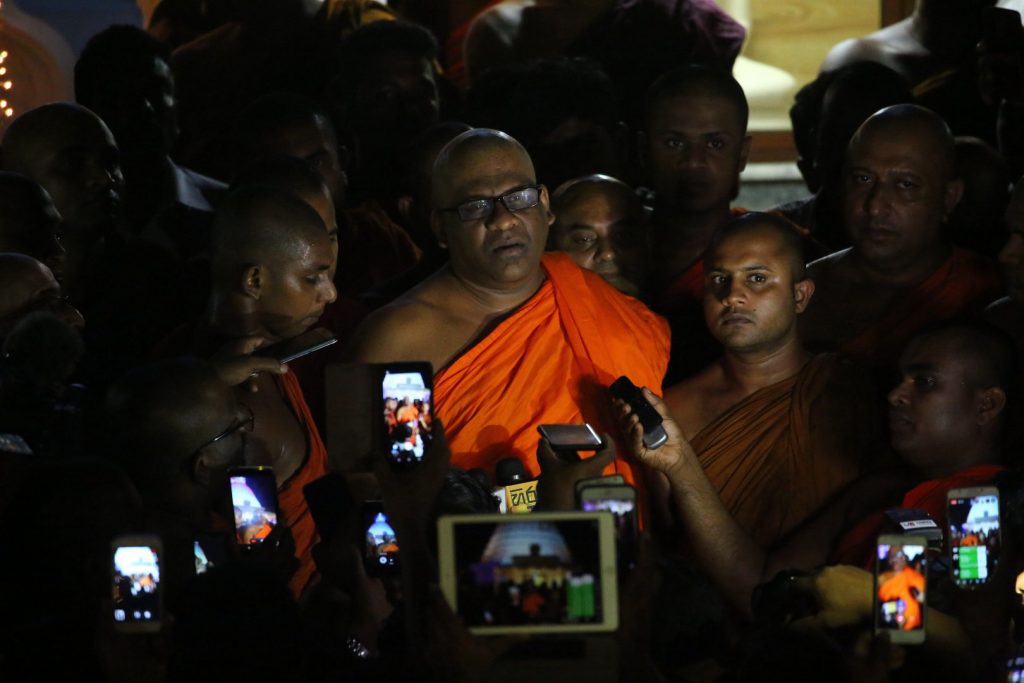Nothing is permanent, so everything is precious. Here’s a selection of some happenings—fleeting or otherwise—in the Buddhist world this week.
Monk Accused of Hate Crimes Elected to Sri Lanka’s Parliament
Galagodaatte Gnanasara, a Buddhist monk who has previously been accused of instigating hate crimes against Muslims, was elected to Sri Lanka’s parliament, Sri Lankan newspaper New Straits Times reported last week. In 2018, Gnanasara—who previously had been accused of anti-Muslim hate crimes—was found guilty of intimidating the wife of a Muslim journalist who went missing while he was investigating alleged use of chemical weapons by the Sri Lankan military. Gnanasara was sentenced to six years in prison but was given a presidential pardon by former Sri Lankan president Maithripala Sirisena after nine months. After he was released, he encouraged Buddhist monks to form their own political front. Despite Gnanasara’s popularity among right-wing Buddhists, leaders of the Buddhist priesthood in Sri Lanka have recently advocated for laws that ban monks from political positions.
Beloved Icon of Tibetan Resistance Dies at 88
One of the longest-serving Tibetan political prisoners, Adhe Tapontsang, affectionately known as Ama Adhe, died in Dharamshala on August 3, the Central Tibetan Administration announced. She was 88. She joined the Tibetan resistance forces in 1954, providing food and provisions to Tibetans fighting against the Chinese. In 1958, Ama Adhe was arrested and served 27 years in prison, where she was one of four out of 300 women to survive a campaign of intentional starvation and torture. Ten years after fleeing to India, she published an account of her incarceration called Ama Adhe: The Voice That Remembers: The Heroic Story of a Woman’s Fight to Free Tibet.
New York Insight Meditation Center Maintains Lease
The New York Insight Meditation Center (NYIMC), located in the Chelsea neighborhood of Manhattan, closed its doors when COVID-19 overwhelmed New York City earlier this year. NYIMC quickly switched to online programming and has not held any in-person events since March. Now the center has announced that it has reached an agreement with the landlord of its current location, allowing NYIMC to remain in its Chelsea home for up to another ten months at a discount and with the option to negotiate terms to stay longer if it chooses. In an email newsletter, NYIMC told sangha members that this situation was a “best-case scenario” for the center. “Even with the uncertainty of not knowing if and when we might be able to safely occupy our space again, we would not likely have been able to simply walk away without litigation,” the email read. “Given that money would have to be spent, at least now we can bide our time and look forward to the possibility of smaller, in-person gatherings when it is safe to do so.”
The pandemic has forced many sanghas and meditation centers to make tough decisions. Last month, the Brooklyn Zen Center announced that it was closing its main sangha in Brooklyn. The following week, meditation center chain MNDFL said that it was closing all its physical locations.
Bhutan Enters First Coronavirus Lockdown
The Buddhist kingdom of Bhutan ordered its first nationwide lockdown this week after a returning resident tested positive for the coronavirus after being discharged from quarantine, Reuters reported. A 27-year-old Bhutanese woman, returning from Kuwait, was discharged after testing negative. On Monday, however, she tested positive at a clinic in Thimphu, the country’s capital. As of Tuesday, 113 cases have been reported and no fatalities. Bhutan has the lowest number of cases in South Asia, but the global pandemic has nonetheless devastated the country’s tourism industry, which generated an average of $80 million in each of the last five years.
Thank you for subscribing to Tricycle! As a nonprofit, we depend on readers like you to keep Buddhist teachings and practices widely available.
